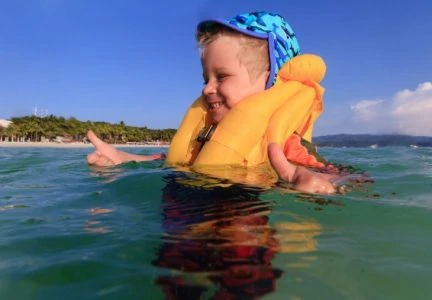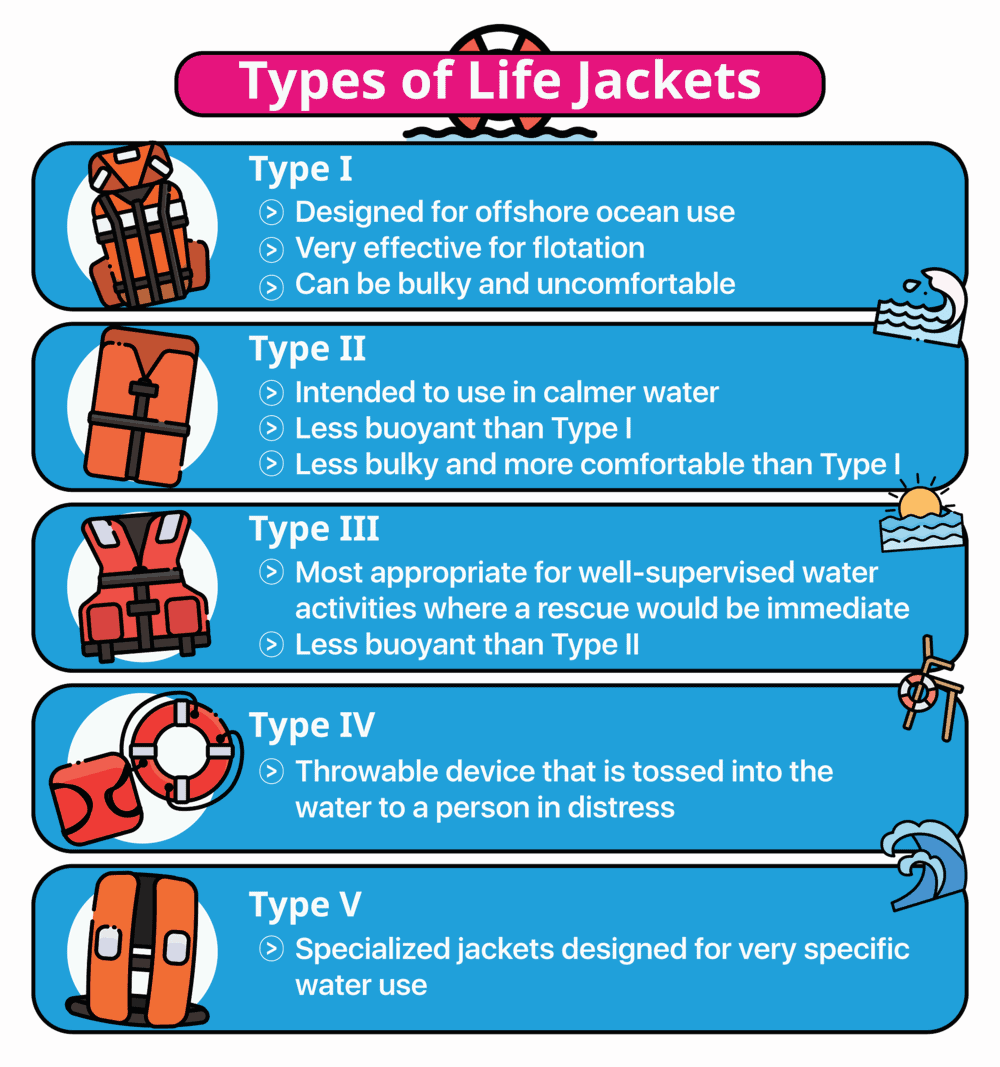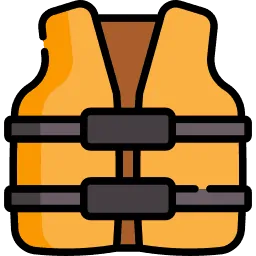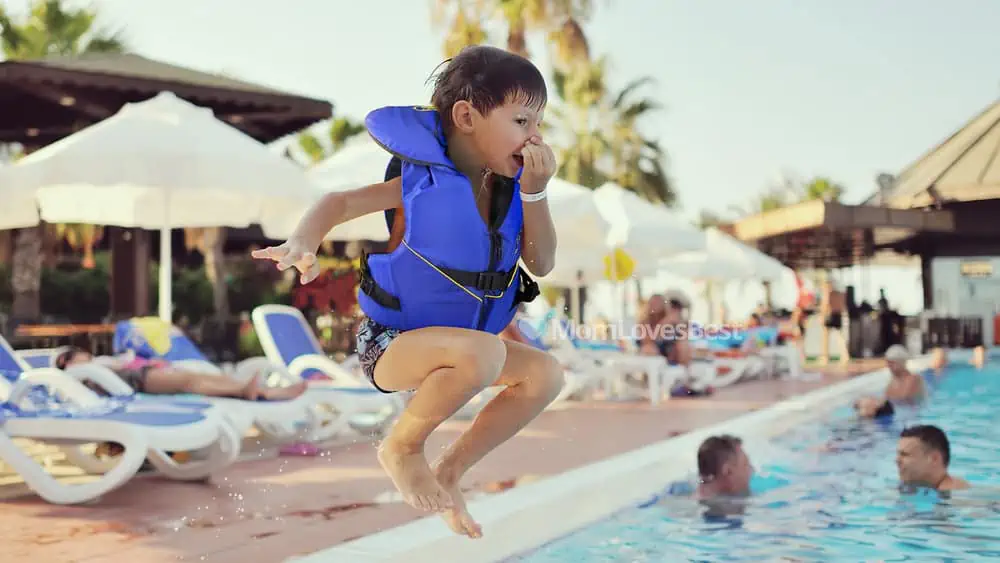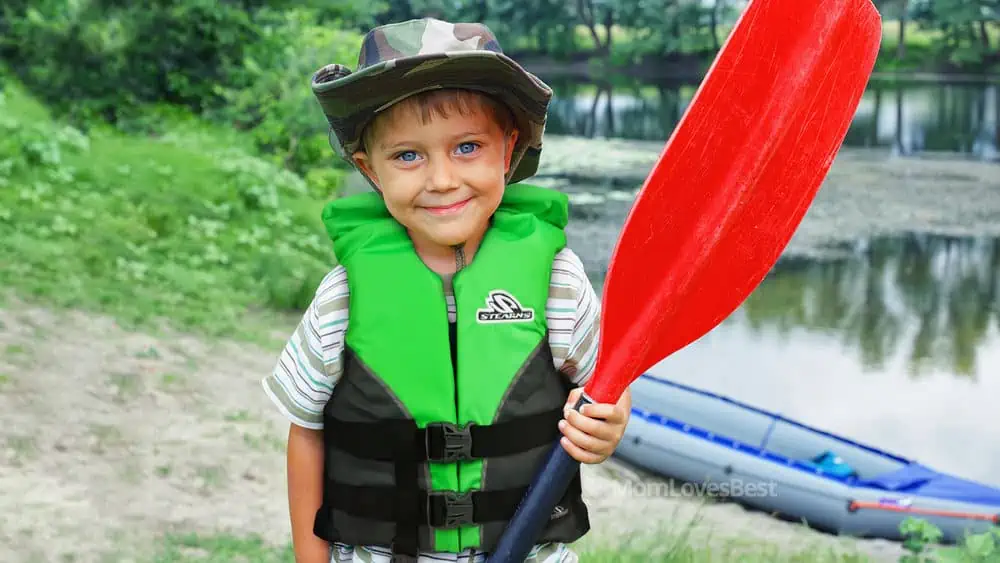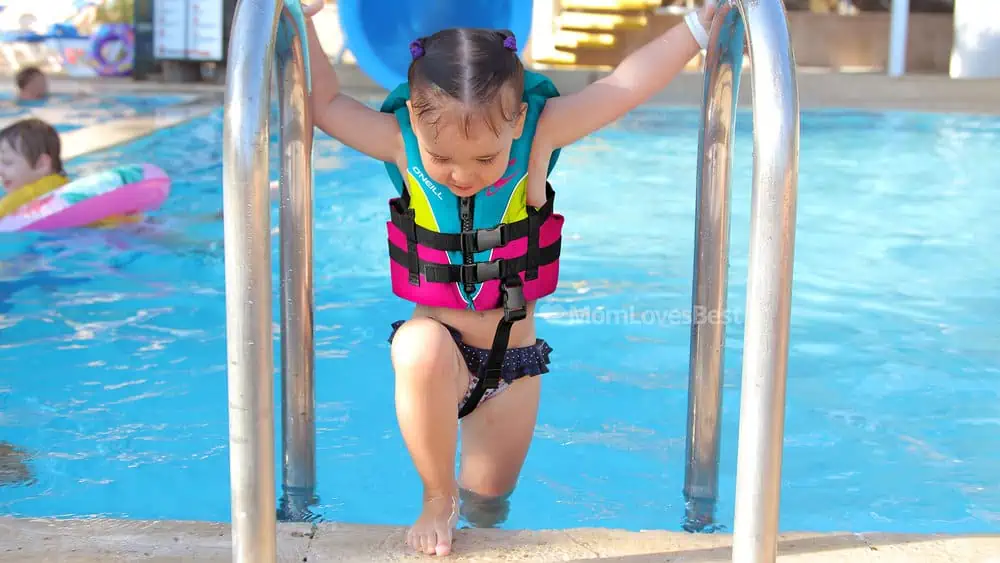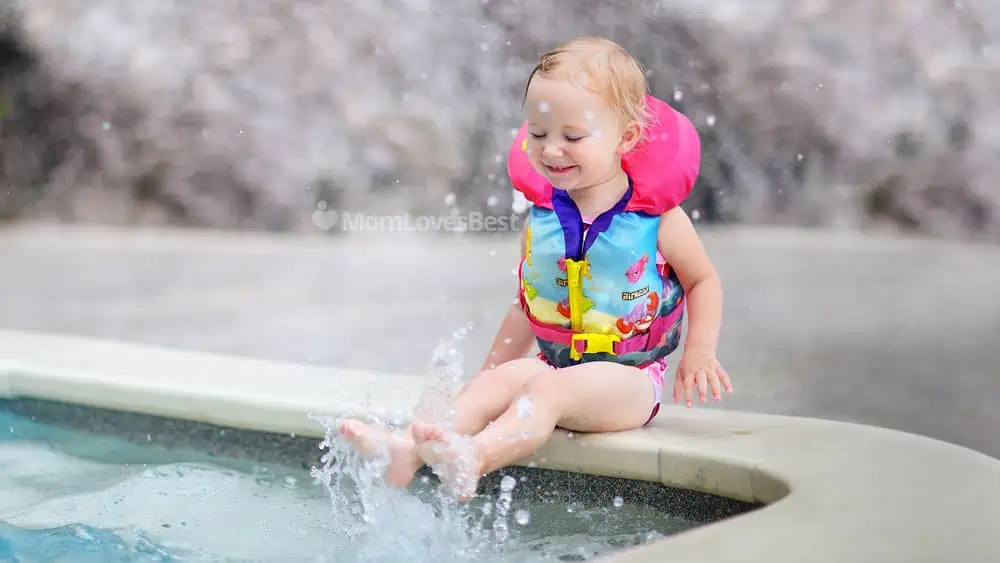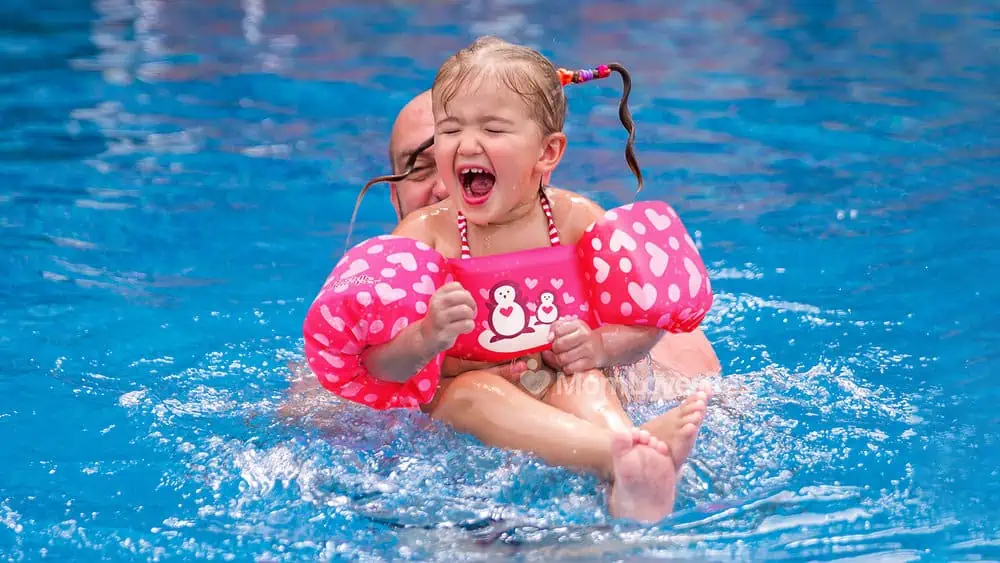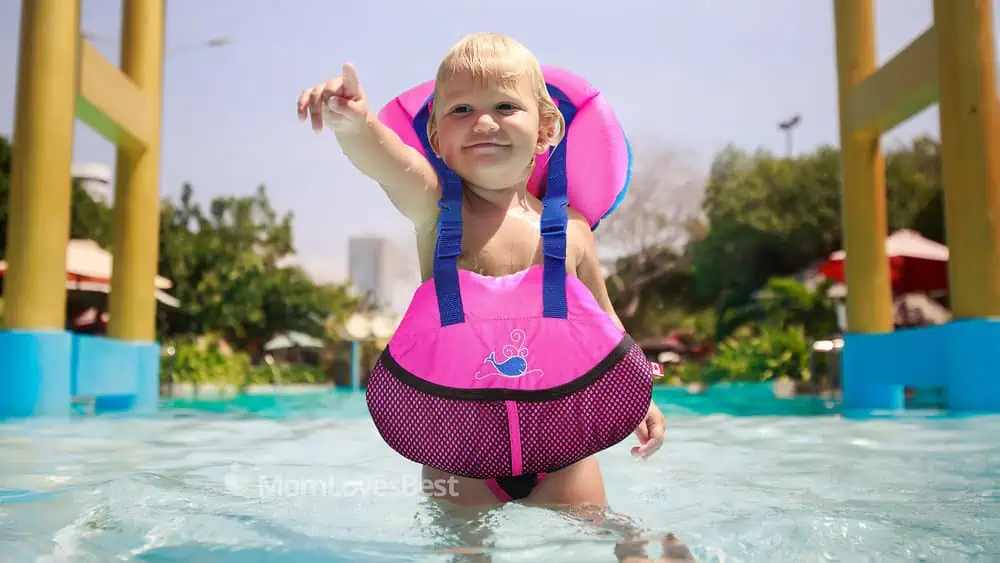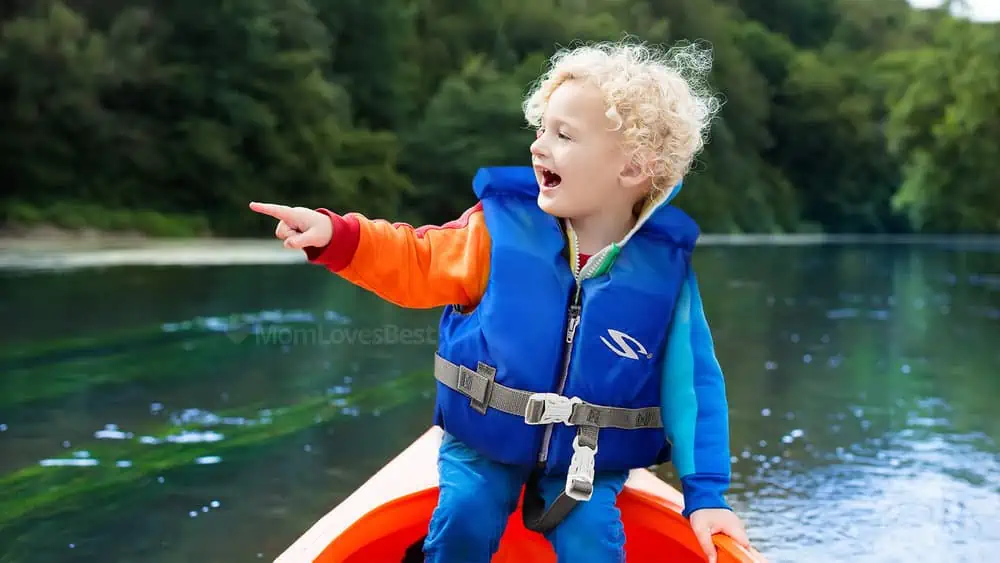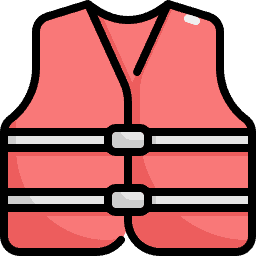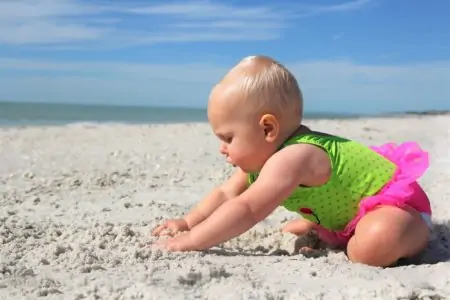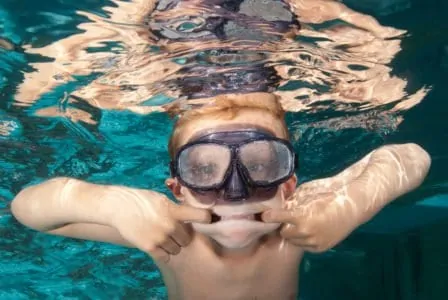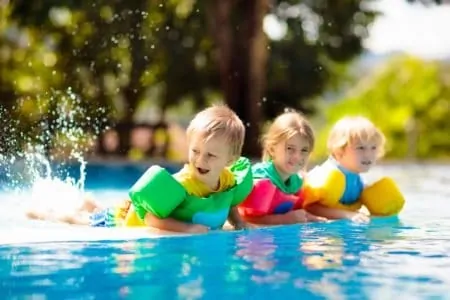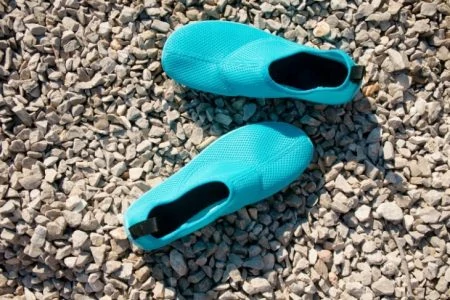Water play is a highlight of childhood summer fun. However, for parents, the combination of kids and open water can be terrifying.
We know drowning is a real danger, but we also want our kids to enjoy the pool, lake, or ocean. The most effective way to balance fun with safety is a properly fitted life jacket.
Finding the right one is tricky. Some are bulky, others are itchy, and toddlers are notorious for refusing to wear them. Worse, some cheap options are little more than toys that won’t keep a child’s head above water.
We consulted safety experts and dug into the research to help you navigate life jacket ratings and styles. We found the best life jackets for kids that are safe, affordable, and comfortable enough that your little one won’t fight you when it’s time to buckle up.
- Less bulky than other models
- Sturdy grab strap
- Will flip baby onto their back
- Straps prevent life jacket slipping off
- Facilitates face-up flotation
- High-quality design
- USCG approved Type II life jacket
- Bright colors are more visible in water
- Grab strap for a quick rescue
- Award-winning Design
- Mesh and webbing harness
- Additional flotation near the head
- US Coast Guard-approved
- Simple and classic vest design
- With leg strap and grab handle
Do Toddlers Need to Wear a Life Jacket?
Drowning is a leading cause of accidental death globally, and it strikes hardest among children aged 1 to 4.
When you combine active adult supervision with a certified life jacket, you give your child the best possible protection.
Even if your child has had swim lessons, a life vest is essential in pools or on boats. Fatigue sets in quickly, and a jacket keeps a tired child safe if they slip under the surface unnoticed.
In boating scenarios, accidents happen fast. If an adult loses consciousness or can’t reach the child, a proper baby float or life jacket keeps them afloat. Many designs are specifically engineered to flip a child face-up to prevent water ingestion until help arrives.
Beyond safety, wearing one is often a legal requirement.
Remember
Ultimately, life jackets build water confidence. You want your child to love the water, not fear it. Wearing a vest early on keeps them safe while they explore and allows them to have fun without constant fear.
How Does a Life Jacket Protect My Child?
Life jackets provide safety through four main mechanisms:
- Buoyancy: Manufacturers fill vests with buoyant foam. This material displaces water based on its size and weight, which keeps the wearer on the surface.
- Visibility: In an emergency, seconds count. A brightly colored toddler swim vest helps rescuers spot your child instantly against dark or churning water. Stick to neon yellow, orange, or red. Avoid blue or gray.
- Head Support: Infant-specific models feature a “heads-up” pillow. This design flips children onto their backs to keep their airways clear, which is critical if the child is unconscious or too young to right themselves.
- Security: Approved jackets feature crotch straps. These prevent the vest from riding up over the child’s face or slipping off entirely when they hit the water.
Types of Life Jackets
US Coast Guard classifications can be confusing, but here is the breakdown for parents (2):
- Type I: These are offshore jackets designed for rough, remote waters where rescue may be delayed. They have the most buoyancy but are bulky and uncomfortable. They are rarely used for casual recreational boating with kids.
- Type II: This is the most common style for children. Type II vests act as “near-shore” buoyant vests. They are less bulky than Type I and more comfortable, making them ideal for fishing and boating in calm inland waters. They usually have a neck pillow to help turn an unconscious wearer face-up.
- Type III: These are flotation aids suitable for protected waters where rescue would be quick. They are comfortable and allow for more movement, making them great for water sports. However, they generally will not turn a child face-up automatically.
- Type IV: These are throwable devices, like life rings or boat cushions. They are not wearable and are not suitable primary safety devices for non-swimmers or children.
- Type V: These are special-use devices, such as work vests or boardsailing vests. Hybrid devices (like Puddle Jumpers) often fall into this category. They count as a life jacket only when worn according to the label.
Things to Consider
Keep these specific criteria in mind when shopping for your child’s safety gear:
Product Reviews
We evaluated comfort, safety ratings, and durability to find these seven top-rated life jackets for babies and toddlers.
Stohlquist Unisex Infant Life Jacket
Best with Head Support
Most infant jackets have a single neck pillow, but Stohlquist upped the ante with a double-collar design.
This additional foam pad cradles your baby’s head securely, offering superior support compared to standard vests. It functions like a pillow to keep their airway clear of the water.
Security is tight with a front zipper and an adjustable buckle. It naturally includes a crotch strap to anchor the vest in place.
Despite the high buoyancy, the profile is surprisingly slim. It is less bulky than cheaper alternatives, making it easier for you to hold your baby comfortably.
Pros
- High-visibility yellow color.
- Double collar provides excellent neck support.
- Dual closure system ensures a secure fit.
- Includes a strong, accessible grab handle.
Cons
- Higher price point than basic models.
- Zipper placement may irritate some babies’ chins.
Our Ratings
Stearns PFD 2000013194 Jacket
Best for the Pool
This jacket features a snug fit with a secure buckle enclosure and a soft polyester liner that feels gentle against the skin.
It is less bulky than offshore gear, making it a great pick for weekends at the pool. The neck flap provides crucial head support, designed to keep a child’s face out of the water in an emergency. It is sized for infants under 30 pounds.
Visibility is excellent thanks to the bright green color. Since it is a USCG-approved Type II vest, it meets legal requirements for boating as well.
Pros
- Bright color is easy to spot in the water.
- Trim profile improves mobility.
- Durable construction lasts through multiple seasons.
- Designed to self-right the child onto their back.
Cons
- Neck opening can run small for some infants.
- Foam can feel stiff initially.
Our Ratings
O’Neill Infant USCG Vest
Best for the Ocean
When you head to the open ocean, you need reliable gear. This O’Neill vest is engineered to flip your baby onto their back quickly, keeping their face clear of waves.
Between the vibrant colors and the sturdy rescue handle behind the neck, you can retrieve your child instantly if they go overboard.
Parents appreciate the comfort level; the nylon shell is soft, and the fit is secure thanks to the crotch strap. The combination of a heavy-duty zipper and adjustable buckles allows for a custom fit that stays tight even in rougher water.
Pros
- Neon colors ensure high visibility.
- Crotch strap prevents ride-up.
- Self-righting design for face-up flotation.
- Premium build quality.
Cons
- Strict weight limit of 30 pounds.
- Limited color palettes available.
Our Ratings
Airhead Treasure Life Vest
Best for Boating
This Airhead vest is built for infants under 30 pounds and features adjustable buckle straps to ensure a locked-in fit.
Boating requires quick reactions, and the accessible grab strap lets you haul your child out of the water immediately. The foam collar provides essential head support whether the baby is floating in the water or napping in the boat.
Kids also love the fun graphics and cartoon designs, which makes convincing them to wear it a little easier.
Pros
- USCG-approved Type II rating.
- Bright colors contrast well against blue water.
- Sturdy rescue handle included.
Cons
- Fit may be loose on newborns or very small infants.
Our Ratings
Stearns Puddle Jumper
Best for Learning to Swim
Traditional life jackets can feel claustrophobic to some kids. If you have a refuser on your hands, the Puddle Jumper is the solution.
It wraps around the chest and arms, buckling in the back so kids can’t take it off themselves. It is a US Coast Guard-approved Type V device (with Type III performance), meaning it is a legitimate safety device, not a toy.
It keeps the head well above water while leaving the torso relatively free. Children can practice kicking and paddle motions, helping them get used to the sensation of being in the pool.
Pros
- Kids generally prefer this comfortable, non-restrictive design.
- Encourages upright water familiarity.
- Buckles in the back for safety.
Cons
- Lacks a grab handle for rescue.
- Not for infants; designed for kids 30-50 lbs.
Our Ratings
Salus Bijoux Baby Vest
Best for Hot Days
Standard vests can turn into sweatboxes on hot days. If you are spending long hours on a boat or the beach, this Salus Bijoux vest prevents overheating.
It utilizes a clever mesh and webbing harness system. This improves airflow and eliminates the sweaty plastic feel against your baby’s skin. The mesh back is a standout feature; it allows the baby to lie flat comfortably in a carrier or on a blanket without a bulky foam pad pushing up their spine.
Rated for babies 9 to 25 pounds, it features a three-piece collar to cradle the head. It is the most comfortable option for keeping a baby safe and cool during extended water activities.
Pros
- Mesh back prevents overheating and adds comfort.
- Extra head flotation cradles the baby.
- Lack of bulky back padding makes holding the baby easier.
Cons
- Harness system has a slight learning curve for parents.
Our Ratings
Stearns Infant Classic Series Vest
Best Vest Life Jacket
Sometimes a classic design is all you need. This Stearns model is an affordable, effective choice for families on a budget.
It features a durable nylon shell over PE flotation foam. It is US Coast Guard-approved for infants under 30 pounds and includes the essential safety trifecta: a leg strap, a grab handle, and a neck pillow.
The head support helps build confidence for babies who are nervous about the water. If you need a reliable “spare” vest for the boat or a starter jacket for swim lessons, this is a solid investment.
Pros
- Durable nylon shell withstands wear and tear.
- Classic open design is easy to put on.
- Grab handle allows for quick water extraction.
Cons
- Sizing can be tricky; verify the fit carefully.
Our Ratings
Is There Anything Else I Should Know?
Life jackets are vital safety tools, but fit is everything. “Infant” vests cover a massive range from 8 to 30 pounds. A vest that fits a 25-pound toddler perfectly might be dangerously loose on a 10-pound newborn.
While taking babies on boats isn’t illegal, the US Coast Guard urges caution:
Note About Infants & Boats
If you must take a small infant boating, test the jacket in a controlled environment like a pool first. Ensure it floats them face-up and doesn’t slide over their chin.
FAQs
The Bottom Line
While the Puddle Jumper wins points for fun and comfort, safety is our priority. That is why our top pick for the best baby life jacket is the Stohlquist Unisex.
It checks every box: US Coast Guard approval, a double-collar for superior head support, and a secure crotch strap. It manages to offer elite protection without the bulk that frustrates most toddlers.
Whatever you choose, remember that the “best” life jacket is the one your child actually wears. Buy the right size, test it in the pool, and enjoy the water with peace of mind.
